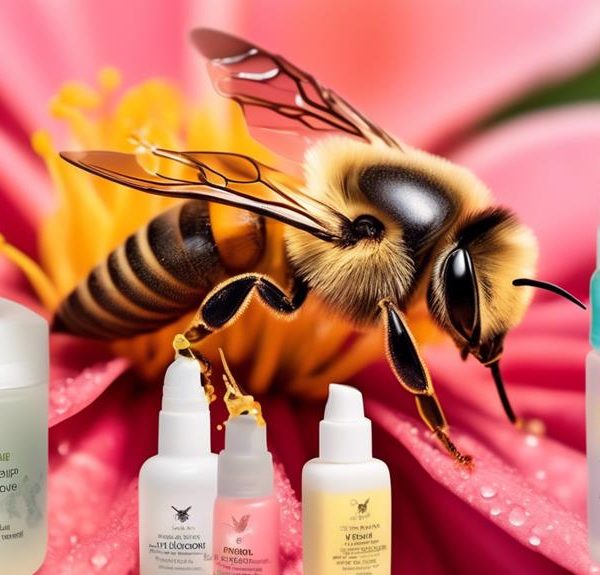Taking a closer look at whether beeswax benefits or hinders the healing of a fresh tattoo, the answer may surprise you.
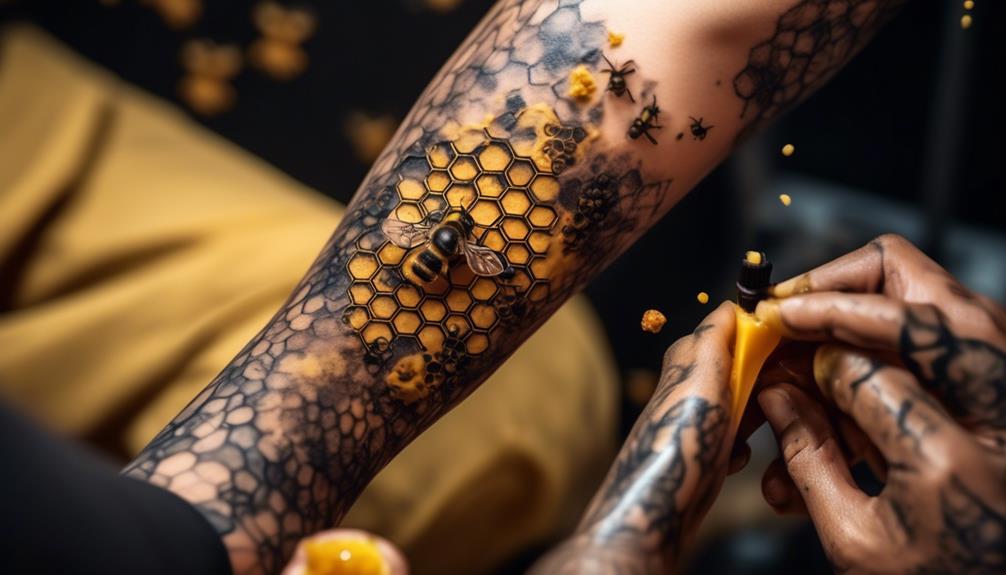
Can You Put Beeswax on a Tattoo?
You might not be aware, but beeswax has been used for centuries in various skincare routines due to its natural hydrating properties. It's a common ingredient in many high-end beauty products and homemade lotions.
But can you apply it to a fresh tattoo? The question may seem odd, but considering the importance of proper tattoo aftercare for the health of your skin and the longevity of your ink, it's worth exploring.
We'll take a closer look at the potential benefits and drawbacks to help you make an informed decision.
Key Takeaways
- Proper tattoo aftercare is crucial for healing and maintaining the longevity of a tattoo.
- Beeswax can be used in skincare as a natural emollient that softens and soothes the skin, forming a protective barrier and locking in moisture.
- However, beeswax may potentially clog pores, especially for those with oily or acne-prone skin, and can cause skin issues if not used cautiously.
- It is recommended to use specially formulated tattoo aftercare products that contain beeswax and consult with a tattoo artist or medical professional before using beeswax on a fresh tattoo.
Understanding Tattoo Aftercare
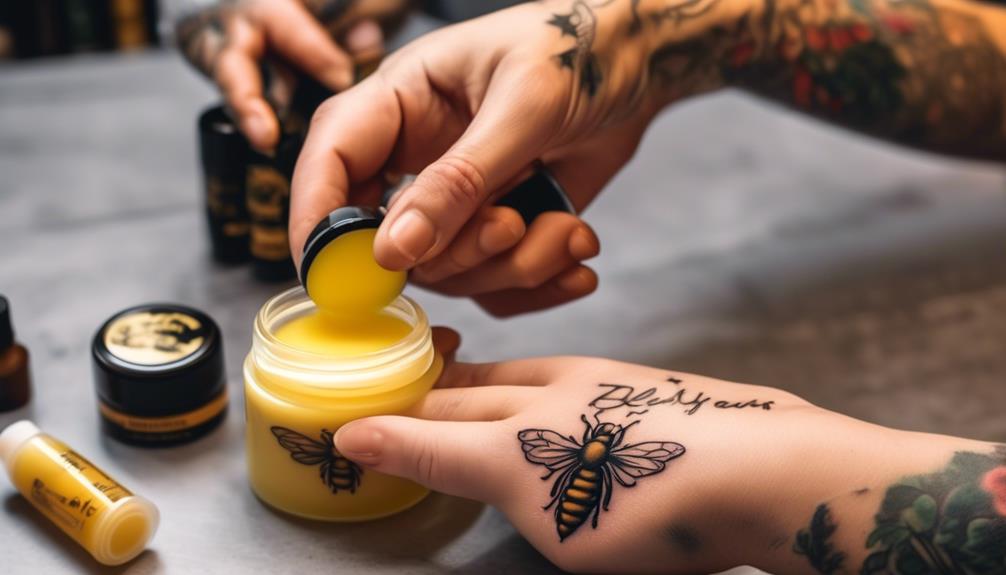
Proper tattoo aftercare is crucial to maintaining the vibrancy and longevity of your new ink, ensuring it heals correctly and looks its best for years to come. It's more than just a routine; it's a commitment you make to your body and to the art you've chosen to display on it.
Your new tattoo is essentially a wound, and like any wound, it's susceptible to infection and scarring if not cared for properly. It's crucial to keep it clean and moisturized, but not overly so. Over-moisturizing can lead to ink leakage, leading to a dull tattoo.
You might be wondering if you can use beeswax on your tattoo. Beeswax, being a natural product, seems like a good choice, but it's not that simple. Pure beeswax is too thick and can clog pores, leading to tattoo pimples. However, beeswax-based products may be of use, provided they're specifically designed for tattoo aftercare.
The Role of Beeswax in Skincare
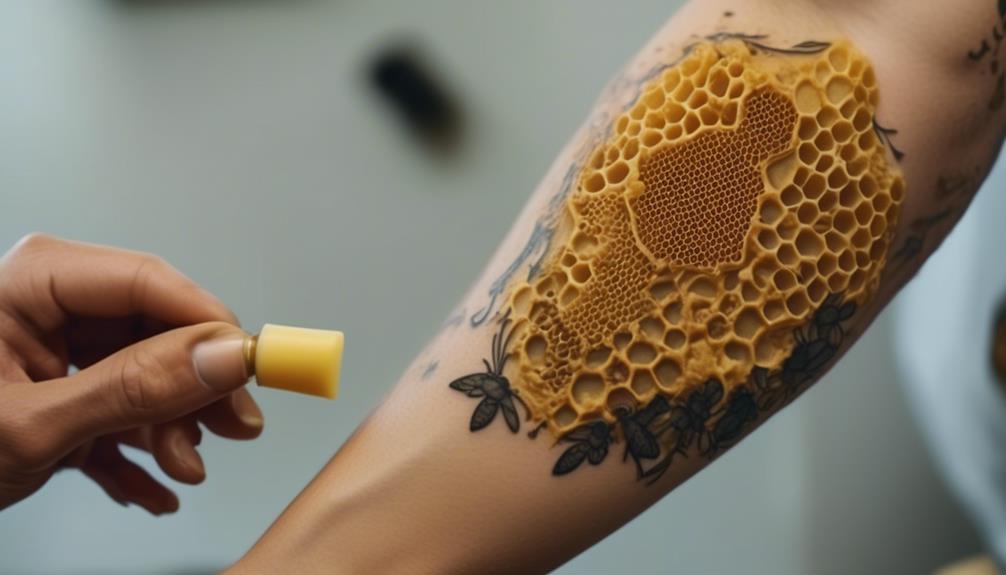
While considering beeswax for tattoo aftercare, it's essential to understand its broader role in skincare, as this natural product offers some unique benefits and potential drawbacks.
Beeswax is a natural emollient, meaning it can soften and soothe the skin. This is particularly beneficial for inflamed or irritated skin, making it an excellent choice for tattoo aftercare. It also forms a protective barrier, locking in moisture and shielding your skin from environmental irritants. This can help your new tattoo heal cleanly and without infection.
However, beeswax is also a heavy wax. It can potentially clog pores, leading to breakouts or other skin issues. If you're prone to oily skin or acne, you might want to use beeswax sparingly or in combination with other, lighter skincare products.
Another advantage of beeswax is its natural antibacterial properties. This makes it effective in preventing infections, which can be crucial when caring for a new tattoo. Yet, it's essential to note that while beeswax can support tattoo healing, it's not a cure-all. Always follow your tattoo artist's aftercare advice and consult a healthcare professional if you experience any adverse reactions.
Applying Beeswax to a New Tattoo
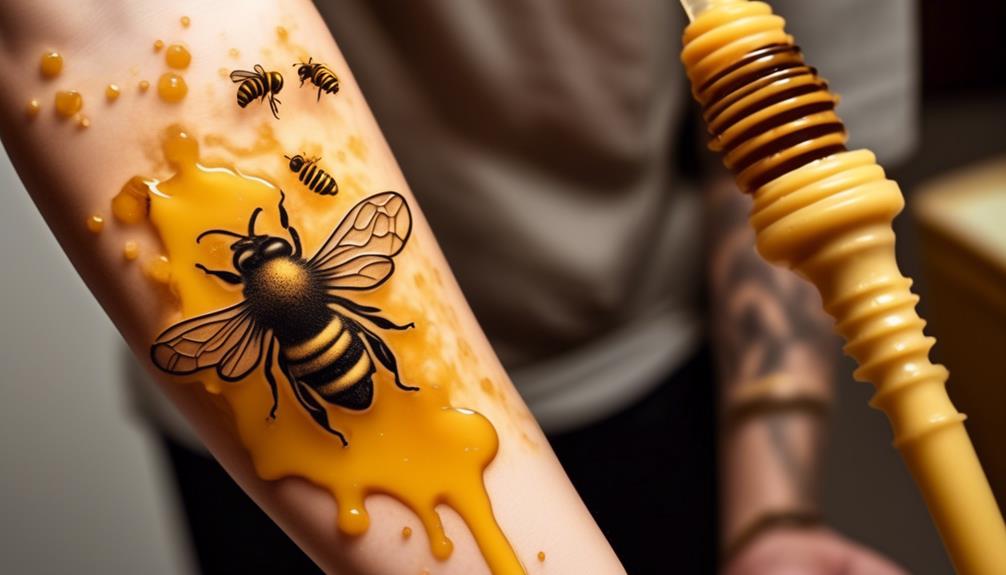
When it comes to applying beeswax on your new tattoo, it's crucial to do it right to maximize healing and minimize any potential skin issues. Beeswax, due to its natural healing properties, is an excellent choice for tattoo aftercare. However, it should be applied correctly to ensure positive results.
Start by cleaning your tattoo gently with mild soap and warm water. Pat it dry with a clean towel. It's essential to ensure your tattoo is completely dry as moisture can breed bacteria.
Next, take a small amount of pure, unrefined beeswax and melt it gently until it becomes a liquid. Ensure it's not too hot as it can burn your skin.
Then, using clean fingers, apply a thin layer of the melted beeswax over your tattoo. Be careful not to rub or press too hard as this can damage your new ink.
Once applied, let the beeswax cool and solidify on your skin. This will create a protective barrier that aids in healing and prevention of infection.
Risks and Benefits of Tattoo Beeswax
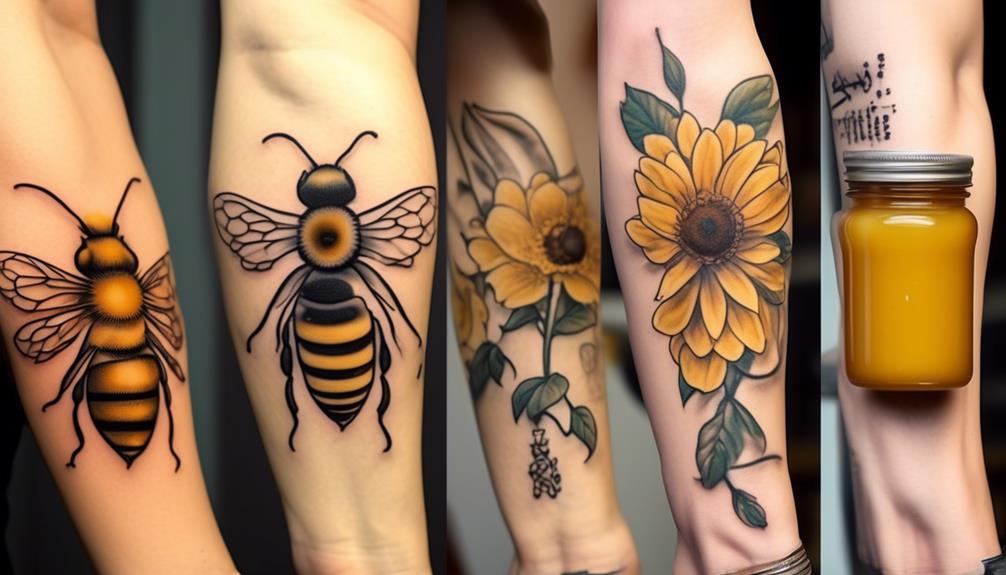
Having explored the application process, it's now vital to understand both the advantages and potential hazards of using beeswax on your tattoo.
On the upside, beeswax is known for its natural moisturizing properties. It forms a protective barrier over your tattoo, aiding in the retention of the skin's natural moisture and promoting optimal healing. Its anti-inflammatory properties can also help reduce redness and irritation associated with fresh tattoos.
However, it's not without its risks. Beeswax is a heavy occlusive, which means it can potentially clog the pores, leading to acne or other skin issues. Additionally, some people may have an allergic reaction to beeswax, resulting in itching, redness, or even hives. It's essential to conduct a patch test before applying it all over your new tattoo to mitigate these risks.
Keep in mind that while beeswax can be beneficial, professional tattoo artists generally recommend specially formulated tattoo aftercare products. These products, while more expensive, are designed specifically to support tattoo healing, reducing the risk of infection and color fading.
However, if you choose to use beeswax, do so with caution and awareness of its potential risks.
Expert Opinions on Beeswax Aftercare
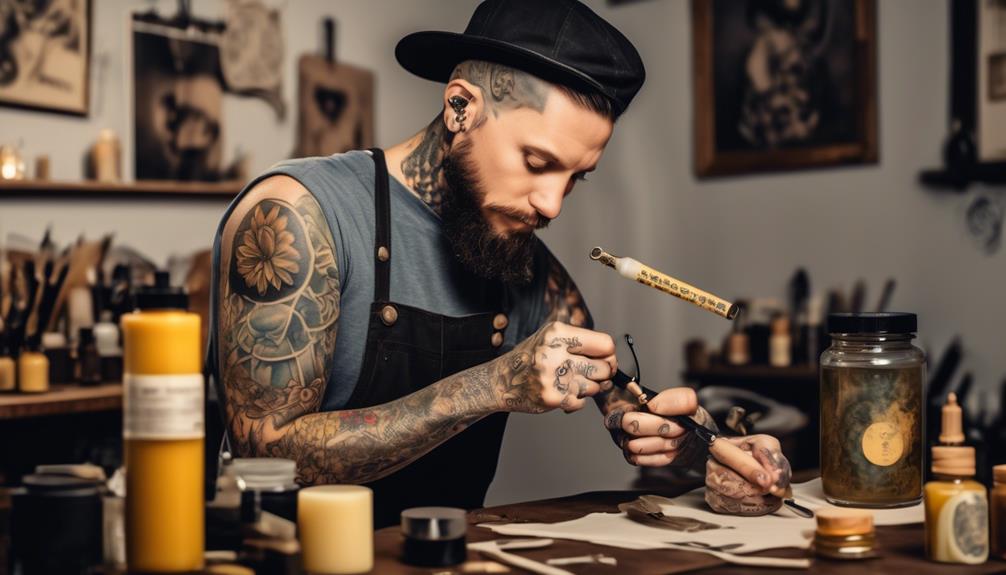
To better understand the use of beeswax in tattoo aftercare, let's delve into the perspectives of seasoned tattoo experts in the field.
Many professionals suggest that beeswax, when incorporated into quality tattoo aftercare products, can provide a natural, protective barrier that aids in healing. It's known for its anti-inflammatory and antibacterial properties, which can help prevent infection and reduce swelling and redness.
However, they also stress that not all beeswax products are created equal. It's essential to ensure you're using a product specifically designed for tattoo aftercare, not a generic beeswax product.
Experts also warn against using beeswax on fresh tattoos that are still weeping ink and plasma, as it can potentially trap harmful bacteria.
Furthermore, some experts advise caution for those with allergies to honey or pollen, as they may also react to beeswax.
As always, if you're considering using beeswax for your tattoo aftercare, it's recommended you consult with your tattoo artist or a medical professional beforehand.
Frequently Asked Questions
Can Beeswax Cause Allergic Reactions When Applied on a Tattoo?
Yes, you can experience allergic reactions from applying beeswax to a tattoo. It's not common, but some folks are allergic to propolis, a component in beeswax. If you're allergic, you might notice redness, swelling, or itching.
It's always best to do a patch test on a small area of skin before applying it to your whole tattoo. If you have any adverse reactions, stop using it immediately and consult a healthcare professional.
Where Can I Purchase Natural Beeswax for Tattoo Aftercare?
Sure, you can purchase natural beeswax for tattoo aftercare from several sources.
Health food stores often carry it, as do many online retailers such as Amazon or eBay.
You'll also find it in specialty shops that sell organic or natural beauty products.
Just ensure you're buying pure, unrefined beeswax to avoid unnecessary additives.
It's always a good idea to consult your tattoo artist or dermatologist before trying new aftercare products.
Is It Safe to Apply Beeswax on a Tattoo During the Healing Process?
Yes, you can safely apply beeswax on a tattoo during the healing process. It's a natural product that can help moisturize and protect your skin. However, make sure it's pure beeswax and doesn't contain any additives that might irritate your skin.
Also, don't apply it too thickly or it could clog your pores. Always test it on a small area of skin first to check for any allergic reactions.
Are There Other Natural Products Apart From Beeswax That Are Recommended for Tattoo Aftercare?
Yes, there are other natural products you can use for tattoo aftercare apart from beeswax.
Coconut oil is highly recommended due to its anti-inflammatory and moisturizing properties.
Shea butter is another good option as it's rich in vitamins A and E, which help in skin healing.
Lastly, aloe vera is known for its soothing and healing properties.
Always remember to consult your tattoo artist before applying any new product to your fresh tattoo.
Can Beeswax Be Used on Older Tattoos or Just on Freshly Inked Ones?
Yes, you can use beeswax on both fresh and older tattoos. It's not just for newly inked skin. Beeswax is known for its moisturizing and healing properties, so it's beneficial for tattoos at any stage.
However, always remember to cleanse the area properly before applying it. If you have any allergies or sensitivities, it's best to do a test patch first. Consult a professional if you're unsure.
Conclusion
In sum, beeswax can be applied to your new tattoo but isn't highly recommended by experts. While it boasts skincare benefits, it may not be the best choice for tattoo aftercare. Risks like clogging pores and slowing healing persist.
So, it's always wise to consult with your tattoo artist or dermatologist before trying out new aftercare methods. Remember, proper care is crucial for your tattoo's longevity and vibrancy.

